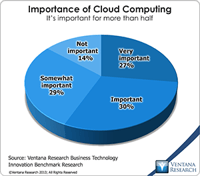At Oracle’s recent cloud computing analyst summit in sunny Palm Springs, the company’s executive team insisted that it sees clear skies for its efforts in cloud computing. The summit was led by senior executive Thomas Kurian, who runs the entire product organization and reports directly to CEO Larry Ellison. He affirmed that Oracle intends to offer the full range of cloud computing – public, private and hybrid models – to its customers and partners. As one of the world’s largest software...
Read More
Topics:
Big Data,
Database,
Microsoft,
SaaS,
Sales Performance,
Social Media,
Software as a Service,
Supply Chain Performance,
Middleware,
Oracle Cloud,
Operational Performance,
Business Analytics,
Business Collaboration,
Business Intelligence,
Business Performance,
Cloud Computing,
Customer & Contact Center,
Financial Performance,
IBM,
Information Applications,
Information Management,
Oracle,
Workforce Performance,
Database as a Service,
Verizon
One trend in business software that’s still in its early stages but gathering momentum is the availability of modeling tools that fill the gap between desktop spreadsheets and enterprise systems. Granted this “early stage” has been under way for quite some time, but the technology has finally progressed to the point where I expect it to get increasing market traction.
Read More
Topics:
Big Data,
Database,
Planning,
Sales Performance,
Forecast,
Office of Finance,
Essbase,
Quantrix,
Operational Performance,
Analytics,
Business Analytics,
Business Collaboration,
Business Intelligence,
Business Performance,
Financial Performance,
In-memory,
Workforce Performance,
finance,
analysis,
analytical application,
business model,
business plan,
financial model
Interest in and development of in-memory technologies have increased over the last few years, driven in part by widespread availability of affordable 64-bit hardware and operating systems and the performance advantages in-memory operations provide over disk-based operations. Some software vendors, such as SAP with its High-Performance Analytic Appliance (HANA) project has been advancing with momentum, have even suggested that we can put our entire analytic systems in memory.
Read More
Topics:
Database,
Enterprise Data Strategy,
IT Performance,
Analytics,
Business Analytics,
Business Intelligence,
CIO,
Complex Event Processing,
In-Memory Computing,
Information Management,
Information Technology










